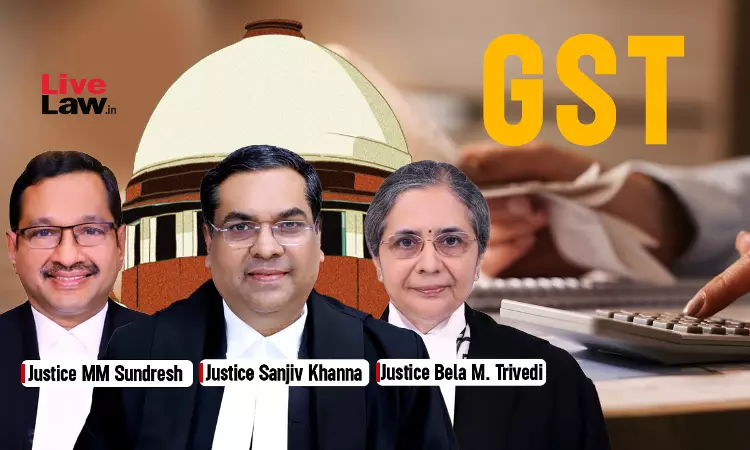- Home
- /
- Top Stories
- /
- Anticipatory Bail Application...
Anticipatory Bail Application Maintainable Against Arrest Under GST Act : Supreme Court Overrules Its Previous Judgments
LIVELAW NEWS NETWORK
27 Feb 2025 3:06 PM IST
The Supreme Court has overruled its previous decisions which held that anticipatory bail applications were not maintainable with respect to offences under the Goods and Services Tax Act.A three-judge bench comprising Chief Justice of India Sanjiv Khanna, Justice MM Sundresh and Justice Bela Trivedi overruled the two-judge bench judgments in State of Gujarat v. Choodamani Parmeshwaran Iyer...
The Supreme Court has overruled its previous decisions which held that anticipatory bail applications were not maintainable with respect to offences under the Goods and Services Tax Act.
A three-judge bench comprising Chief Justice of India Sanjiv Khanna, Justice MM Sundresh and Justice Bela Trivedi overruled the two-judge bench judgments in State of Gujarat v. Choodamani Parmeshwaran Iyer and Another and Bharat Bhushan v. Director General of GST Intelligence, Nagpur Zonal Unit Through Its Investigating officer which held that a person summoned under the GST Act cannot file anticipatory bail application and that the only remedy was to file a writ petition under Article 226 of the Constitution.
In the present case(Radhika Agarwal vs Union of India), the Court was dealing with a lot of issues relating to the arrest procedure under the GST Act and the Customs Act.
The judgment authored by CJI Khanna stated that the power to grant anticipatory bail arises when there is apprehension of arrest.This power, vested in the courts under the Criminal Procedure Code, affirms the right to life and liberty under Article 21 of the Constitution to protect persons from being arrested.
It was noted that in Gurbaksh Singh Sibbia vs State of Punjab(1980), the Supreme Court had held that when a person complains of apprehension of arrest and approaches for an order of protection, such application when based upon facts which are not vague or general allegations, should be considered by the court to evaluate the threat of apprehension and its gravity or seriousness.
"We also wish to clarify that the power to grant anticipatory bail arises when there is apprehension of arrest...It is not essential that the application for anticipatory bail should be moved only after an FIR is filed, as long as facts are clear and there is a reasonable basis for apprehending arrest. This principle was confirmed recently by a Constitution Bench of Five Judges of this Court in Sushila Aggarwal and others v. State (NCT of Delhi) and Another. Some decisions of this Court in the context of GST Acts which are contrary to the aforesaid ratio should not be treated as binding," the judgment stated.
The Court also held that anticipatory bail provision was applicable to offences under the Customs Act as well. The registration of a case and entries of a case diary are not compulsory when entertaining an application for grant of anticipatory bail under Sections 438 and 439 of the Code, the Court noted, relying on the decision in Directorate of Enforcement v. Deepak Mahajan, (1994) 3 SCC 440.
Other reports about the judgment can be read here.
Case Title: Radhika Agarwal v. Union of India and Ors., W.P.(Crl.) No. 336/2018 (and connected matters)
Citation : 2025 LiveLaw (SC) 255Click Here To Read/Download Judgment
Also from the judgment - BNSS/CrPC Provisions On Rights Of Arrested Persons Applicable To GST & Customs Acts : Supreme Court



